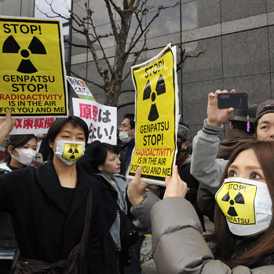Fukushima: very low levels of radiation reach UK
As extremely low levels of radiation from the Fukushima nuclear plant in Japan are detected in Glasgow, Japanese residents tell Channel 4 News their fears over the ongoing crisis.
Low levels of radioactive iodine believed to be from the Fukushima plant were detected in Glasgow on Tuesday.
But the authorities said there was no concern for public health or the environment as the levels are so low.
Dr James Gemmill, of the Scottish Environment Protection Agency (Sepa), said: “The concentration of iodine detected is extremely low and is not of concern for the public or the environment. The fact that such a low concentration of this radionuclide was detected demonstrates how effective the surveillance programme for radioactive substances is in the UK.
“Sepa has an ongoing comprehensive monitoring programme for radioactivity in Scotland and has increased the level of scrutiny to provide ongoing public assurance during this period.”
Fears in Japan
Jon Snow blogged about the nuclear crisis on Monday - and got the following responses from worried citizens in Japan.
Tom Asano said: "I live in Tokyo. Plutonium was detected on the ground of Fukushima Daichi nuclear power plant. A situation that seems to be worsening every moment.
"Tepco [plant owner], the Japanese Government and Japanese news are having an optimistic outlook now. If Tepco, Japanese Government and Japanese news continue to have an optimistic outlook regarding this serious situation, many people in Japan have to suffer serious damage."
William Hesketh, living on the Pacific coast of western Japan, said: "And now the nuclear crisis...one engineer, actually a family friend, now scheduled to take his turn at Fukushima. We are told the pressure to do so is considerable, making talk of heroic volunteers seem not so much untrue as incomplete.
"And here every day my own two daughters ask me if it is safe to play outside."
Michael Aylett, in Iwate Prefecture, said: "I living in Iwate Prefecture, the consequences of both seen and unseen disasters are daily life. I run a school and a small vegetable farm. While my relatives in Kamaishi are safe, those of a student are still missing. While my farm can grow and sell spinach, other farms in other prefectures can't. No one I know trusts the official message."
Read more responses on Jon Snow's Fukushima blog
Japan
However in Japan fears continue to rise as the nuclear plant shows no signs of stabilising. On Monday, plutonium was found in soil surrounding Fukushima, as well as high levels of radioactivity in the water in concrete tunnels outside the reactors, suggesting there may have been a breach in one of the reactors.
Japan’s Nuclear and Industrial Safety Agency said while the plutonium levels were not harmful to human health, the discovery could mean the reactor’s containment mechanism had been breached.
“Plutonium is a substance that’s emitted when the temperature is high, and it’s also heavy and so does not leak out easily,” Deputy Director Hidehiko Nishiyama told a news conference.
Read more from Channel 4 News on the Japan nuclear crisis: who is in charge?

“So if plutonium has emerged from the reactor, that tells us something about the damage to the fuel. And if it has breached the original containment system, it underlines the gravity and seriousness of this accident.”
But Sakae Muto, Vice-President at Tokyo Electric Power, the owner of the plant, said the traces of plutonium-238, 239 and 240 were in keeping with levels found in Japan in the past due to particles in the atmosphere from nuclear testing abroad.
Pressure
The Prime Minister has come under pressure to consider increasing the evacuation zone limits as the country battles to contain the world’s worst atomic crisis for 25 years.
Prime Minister Naoto Kan said he was seeking advice over evacuating 130,000 people in a 30km zone, in addition to the 70,000 already displaced by the nuclear crisis, sparked by the earthquake and ensuing tsunami on 11 March. Around 28,000 people remain missing after this devastating disaster – compounding Japan’s agony.
US experts said that there was also radioactive contamination in vegetables and milk from the area near the nuclear plant, and groundwater, reservoirs and the sea also faced “significant contamination”.
France has sent two nuclear experts to help contain the accident and French President Nicolas Sarkozy will visit on Thursday, the first foreign leader to visit since the earthquake.